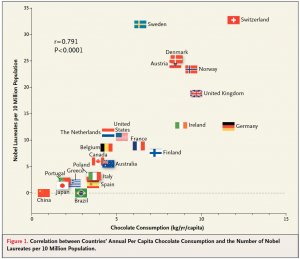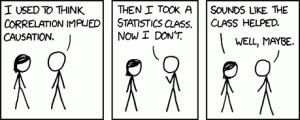A couple of weeks ago, Slate published two oddly similar articles within a few days of each other: Extra Points Are For Losers and The Supreme Court Justice Death Calculator.
You might not initially think the articles have that much in common: one’s about football strategy and one’s about the future of the US Supreme Court. But beneath the surface they’re practically the same: both are calculations of joint probabilities for multiple events.
The football article points out that in a certain situation it’s provably the right strategy for an NFL team to go for a two-point conversion instead of a single extra point. Specifically, if you’re down 14 points near the end of the game, and you score a touchdown, you should go for 2.
You can go to the article for details, but here’s the idea. The decision only matters under the assumption that you’re going to get another touchdown and the other team isn’t going to score. So let’s assume that that’s going to happen. If you take the usual extra point each time, you’re going into overtime (assuming your kicker always gets the extra point, which is roughly true in pro football), and you’ve got a 50-50 shot at a win . On the other hand, if you go for the two-point conversion, either you make it and are guaranteed a win, or you miss it, in which case you go for 2 again the next time and have a chance to throw the game into overtime again. You can check by a straightforward calculation that the second strategy gives you better than even odds of winning (for reasonable estimates of the likelihood of a two-point conversion).
The Supreme Court article contains a slightly macabre app that lets you calculate the probabilities of various combinations of Supreme Court justices dying during the second Obama administration. Want to know the odds that Obama will get to appoint a replacement for one of the conservative justices? One of the liberals? One of each? You can play around to your heart’s content.
The math underlying both of these calculations is exactly the same. It’s pretty much just
P(A and B) = P(A) P(B).
That is, to get the probability that two independent events both occur, you multiply together the probabilities of each one.
Oddly, the two articles take different approaches to calculating the probabilities. The football article just calculates them directly by doing the multiplication, but the Supreme Court article estimates them by simulation. If you ask the app for the probability that both Scalia and Kagan will die, it runs 10,000 simulations of the future and counts up the results.
That’s actually not a very good thing to do, especially if you’re interested in low-probability combinations such as this one. If you ask the app that question repeatedly, the numbers bounce around: 0.32%, 0.26%, 0.27%, 0.41%.
In the guts of the program there must be probabilities for each of the individual events, so you could answer this question by simply multiplying them together. The result wouldn’t jump around like that and would be more precise than the simulation-based one (although not necessarily more accurate — as the article points out, the calculation is based on some assumptions that might not be correct).
You could reduce the scatter by raising the number of simulations, of course, but it’s odd to use simulations in this situation to begin with. Estimating probabilities via simulation is a great tool when it’s impossible or difficult to calculate the probabilities exactly, but in a situation like this it’s quicker, simpler, and more precise to just calculate them.

